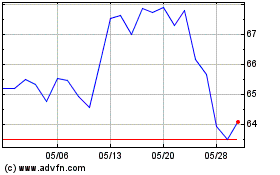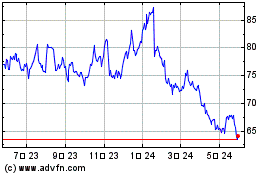- 70% of Patients Receiving Seladelpar 10mg
Achieved the Clinically Meaningful Composite Endpoint and 37%
Achieved ALP Normalization at 12 Months -
- Reduction in Patient-Reported Pruritus
(Itching) was Rapid and Durable in Patients with Moderate to Severe
Symptoms -
- Positive Interim Results are Highly
Consistent with Results from the Phase 3 RESPONSE Study of
Seladelpar -
Gilead Sciences, Inc. (Nasdaq: GILD), following the recent
acquisition of CymaBay Therapeutics, Inc., today announced interim
results from the ongoing ASSURE study demonstrating treatment with
seladelpar, an investigational PPAR delta agonist, led to
improvements in markers of cholestasis and reduced inflammation.
Additional findings demonstrate that seladelpar can help reduce
pruritus (itch) in people living with primary biliary cholangitis
(PBC). There are currently no treatments indicated to treat
PBC-related pruritis. This data will be shared in an oral
presentation during the Presidential Plenary of the Digestive
Disease Week® 2024 Conference in Washington, DC.
ASSURE is an open-label study evaluating the long-term safety
and efficacy of seladelpar, a once daily potent and selective
peroxisome proliferator-activated receptor (PPAR) delta agonist, or
delpar. ASSURE enrolled adult patients with PBC who previously
participated in a study of seladelpar where a key eligibility
criterion included having an inadequate response or intolerance to
ursodeoxycholic acid (UDCA). This interim data analysis did not
include patients from the Phase 3 RESPONSE study, which will be
reported separately. Of the 174 patients included, the majority had
a gap of one year or more between completion of the respective
primary study (seladelpar or placebo) and enrollment into ASSURE.
Enrolled patients received an open-label oral dose of 10 mg
seladelpar once daily, with the majority (97%) also receiving UDCA
treatment.
Most patients enrolled in ASSURE were female (94%), with a mean
age of 59 years. Baseline characteristics included mean alkaline
phosphatase (ALP) 270.5 U/L and total bilirubin (TB) 0.75 mg/dL;
19% of enrolled patients met the criteria for cirrhosis. The study
evaluated several prespecified biochemical endpoints, including the
composite response of an alkaline phosphatase (ALP) below 1.67 x
upper limit of normal (ULN), a decrease in ALP of at least 15%, and
a total bilirubin (TB) below the ULN. Endpoints were evaluated over
an interim observation period extending from enrollment through a
data cutoff date of June 29, 2023, with the majority of those (85%)
having at least 12 months of continuous treatment with seladelpar.
Seventy percent of the 148 patients who completed 12 months of
treatment achieved the clinically meaningful composite response
endpoint. Among those receiving seladelpar, 37% experienced ALP
normalization, with a mean ALP change from baseline of -44% (-144.4
U/L). Of the 20 patients who completed 24 months of treatment, 70%
achieved the composite response endpoint and 25% experienced ALP
normalization. Seladelpar also reduced other important biomarkers
of liver injury including TB, gamma-glutamyl transferase (GGT) and
alanine aminotransferase (ALT) levels by 9%, 36%, and 25% from
baseline, respectively. There were no treatment-related serious
adverse events in the study, as determined by the study
investigators. Seladelpar was generally well tolerated, with
discontinuation due to adverse events occurring in 4.6% of
patients.
“We are encouraged by these positive interim results from
ASSURE, which are highly consistent with those observed in the
Phase 3, double-blind placebo-controlled RESPONSE study of
seladelpar in people with an inadequate response or intolerance to
UDCA,” said Cynthia Levy, M.D., Professor of Medicine, University
of Miami and presenter of the study. “Seladelpar continues to
demonstrate a significant impact on PBC disease in the liver, helps
a significant proportion of patients achieve normalization of their
ALP and importantly reduces pruritus, which is often a debilitating
and unrelenting comorbidity. The safety and tolerability profile of
seladelpar is consistent with previous studies in PBC and
underscores its potential as a promising therapeutic option for
people living with PBC.”
Patient-reported pruritus was monitored throughout the study
using the numerical rating scale (NRS; 0-10). In the 60 patients
with moderate-to-severe pruritus at baseline with an NRS score of
≥4, a rapid improvement in pruritus was observed at Month 1. By
Month 6 the patients reported a mean reduction of 3.5 points, and
this impact was sustained through Month 12.
“The initial data from ASSURE further support the efficacy and
safety profile of seladelpar observed across the robust development
program and continue to indicate that seladelpar has the potential
to be a best-in-class therapy that could help transform treatment
for people living with primary biliary cholangitis,” said Merdad
Parsey, Chief Medical Officer, Gilead Sciences. “The PBC community
has been waiting for new treatments that help slow the progression
of their liver disease as well as address difficult symptoms like
pruritus that can have a significant impact on their quality of
life. We are excited to offer a new option for this community as we
work to bring seladelpar to people living with PBC, if
approved.”
Additional results from ASSURE, including the long-term study of
patients rolled over from RESPONSE to the ASSURE study, will be
available at a future medical meeting.
A New Drug Application (NDA) for seladelpar for the treatment of
PBC, including pruritus, in adults without cirrhosis or with
compensated cirrhosis (Child Pugh A) who are inadequate responders
or intolerant to UDCA, has been accepted for priority review by the
U.S. Food and Drug Administration (FDA) with an anticipated
decision in August 2024. Seladelpar has also been accepted for
review by the UK Medicines and Healthcare products Regulatory
Agency (MHRA) and the European Medicines Agency (EMA).
About ASSURE
(NCT03301506)
ASSURE is an open label study to evaluate the long-term safety
and tolerability of seladelpar in people with primary biliary
cholangitis (PBC) who have already participated in other PBC
clinical trials of seladelpar. The study is currently enrolling up
to 500 people living with PBC from across 160 sites around the
world. ASSURE will also address the long-term efficacy of
seladelpar and its impact on important patient reported outcomes
such as pruritus, or severe itch, which can have a significant
impact on the quality of life of people living with PBC.
Interim results of ASSURE (Session #2060), titled “Efficacy and
Safety of Seladelpar in Patients with Primary Biliary Cholangitis
in the ASSURE Study: Interim Results,” will be presented Dr.
Cynthia Levy on behalf of the ASSURE Study investigators during the
DDW 2024 Presidential Plenary on May 18, 2024, from 8:00 am to 9:30
am EDT.
About Seladelpar
Seladelpar, an investigational treatment for people with PBC, is
a first-in-class oral, selective PPAR-delta agonist, or delpar.
PPAR-delta has been shown to regulate critical metabolic and liver
disease pathways. Preclinical and clinical data support its ability
to regulate genes involved in bile acid synthesis, inflammation,
fibrosis and lipid metabolism, storage, and transport. Seladelpar
is not approved by the FDA or any other regulatory authority
globally and has not been determined to be safe or efficacious for
any use.
About PBC
PBC is a rare, chronic inflammatory liver disease primarily
affecting women (1 in 1,000 women over the age of 40 or about
130,000 total people in the U.S.). PBC is characterized by impaired
bile flow (known as cholestasis) and the accumulation of toxic bile
acids in the liver, leading to inflammation and destruction of the
bile ducts within the liver and causing increased levels of ALP,
ALT, and GGT, enzymes found primarily in the liver, as well as
total bilirubin. The most common early symptoms of PBC are pruritus
(itching) and fatigue, which can be debilitating for some patients.
Progression of PBC is associated with an increased risk of
liver-related mortality.
About CymaBay
CymaBay Therapeutics Inc. was acquired by Gilead Sciences in
March 2024. CymaBay Therapeutics, a Gilead Company, is a
clinical-stage biopharmaceutical company focused on improving the
lives of people with liver and other chronic diseases that have
high unmet medical need. Our deep understanding of the underlying
mechanisms of liver inflammation and fibrosis, and the unique
targets that play a role in their progression, helped CymaBay
receive breakthrough therapy designation and orphan drug status
from the U.S. Food and Drug Administration for seladelpar, a
first-in-class investigational treatment for people with PBC.
About Gilead Sciences in Liver
Disease
For decades, Gilead has pioneered the way forward to improve the
lives of people living with liver disease around the world. We have
helped to transform hepatitis C from a chronic condition into one
that can be cured for millions of people. For people living with
hepatitis B or D, our focus on advancing our medicines drives hope
that today’s research will turn into tomorrow’s cures. Beyond viral
hepatitis, we’re working to deliver advanced treatments for people
living with primary biliary cirrhosis (PBC). But our commitment
doesn’t stop there. Through our ground-breaking science and
collaborative partnerships, we strive to create healthier futures
for everyone living with liver disease. We are committed to a
future without liver disease.
About Gilead Sciences
Gilead Sciences, Inc. is a biopharmaceutical company that has
pursued and achieved breakthroughs in medicine for more than three
decades, with the goal of creating a healthier world for all
people. The company is committed to advancing innovative medicines
to prevent and treat life-threatening diseases, including HIV,
viral hepatitis, COVID-19 cancer and inflammation. Gilead operates
in more than 35 countries worldwide, with headquarters in Foster
City, California.
Forward-Looking Statements
This press release includes forward-looking statements, within
the meaning of the Private Securities Litigation Reform Act of 1995
that are subject to risks, uncertainties and other factors,
including the ability of Gilead and CymaBay to initiate, progress
or complete clinical trials within currently anticipated timelines
or at all, and the possibility of unfavorable results from ongoing
or additional clinical studies, including those involving
seladelpar; the possibility that Gilead and CymaBay may make a
strategic decision to discontinue development of programs for
indications that are currently under evaluation and, as a result,
these programs may never be successfully commercialized for such
indications; uncertainties relating to regulatory applications and
related filing and approval timelines, including the risk that the
FDA, MHRA or EMA may not approve seladelpar the treatment of
primary biliary cholangitis, and the risk that any such approvals,
if granted, may be subject to significant limitations on use; and
any assumptions underlying any of the foregoing. These and other
risks, uncertainties and factors are described in detail in
Gilead’s Quarterly Report on Form 10-Q for the quarter ended March
31, 2024, as filed with the U.S. Securities and Exchange
Commission. These risks, uncertainties and other factors could
cause actual results to differ materially from those referred to in
the forward-looking statements. All statements other than
statements of historical fact are statements that could be deemed
forward-looking statements. The reader is cautioned that any such
forward-looking statements are not guarantees of future performance
and involve risks and uncertainties, and is cautioned not to place
undue reliance on these forward-looking statements. All
forward-looking statements are based on information currently
available to Gilead and CymaBay, and Gilead and CymaBay assume no
obligation and disclaim any intent to update any such
forward-looking statements.
Gilead and the Gilead logo are trademarks of
Gilead Sciences, Inc. or its related companies.
For more information on Gilead’s commitment in
Liver Disease please visit www.gilead.com.
For more information on investigational
seladelpar and ASSURE please visit www.cymabay.com.
View source
version on businesswire.com: https://www.businesswire.com/news/home/20240518003116/en/
Meaghan Smith, Media public_affairs@gilead.com
Jacquie Ross, Investors investor_relations@gilead.com
Gilead Sciences (NASDAQ:GILD)
過去 株価チャート
から 5 2024 まで 6 2024

Gilead Sciences (NASDAQ:GILD)
過去 株価チャート
から 6 2023 まで 6 2024
